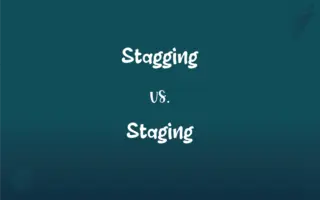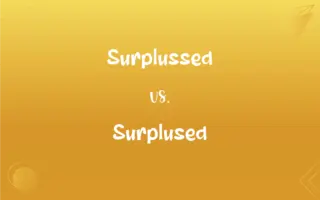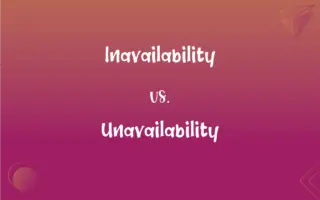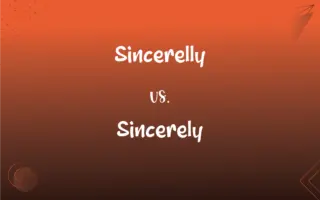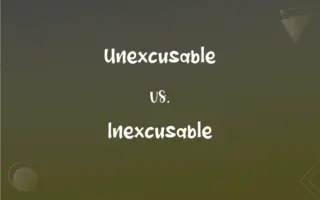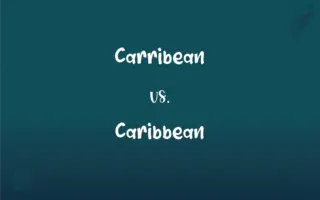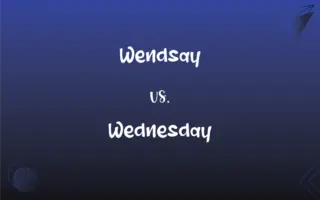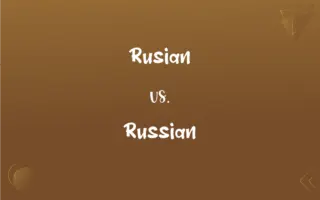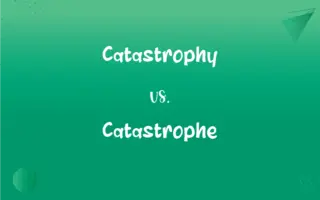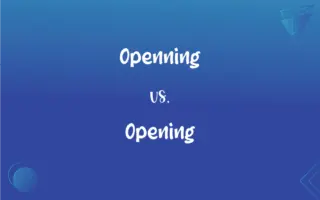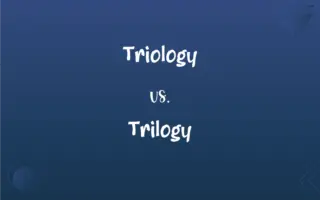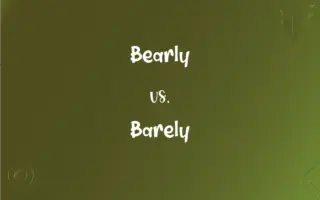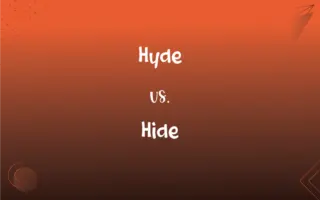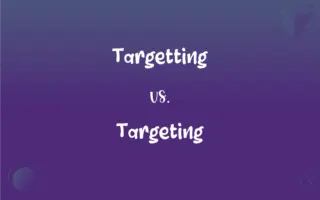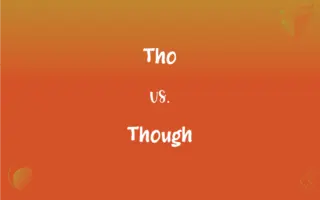Affraid vs. Afraid: Mastering the Correct Spelling
Edited by Aimie Carlson || By Janet White || Published on March 16, 2024
"Affraid" is an incorrect spelling; the correct spelling is "afraid" which means feeling fear or anxiety.

Which is correct: Affraid or Afraid
How to spell Afraid?

Affraid is Incorrect

Afraid is Correct
ADVERTISEMENT
Key Differences
Think "A-fraid" for A feeling of fear.
"Afraid" is shorter, as fear often makes us feel small.
"Fraid" rhymes with "afraid", no extra 'f'.
"Afraid" has one 'f', like "fear".
Connect "afraid" with "a" single "f" for fear.
ADVERTISEMENT
Correct usage of Afraid
They were affraid the storm would hit their town.
They were afraid the storm would hit their town.
I'm affraid I can't make it to your party.
I'm afraid I can't make it to your party.
He's affraid of the dark.
He's afraid of the dark.
She was affraid to speak in public.
She was afraid to speak in public.
She felt affraid when she heard the noise.
She felt afraid when she heard the noise.
Afraid Definitions
Feeling fear or anxiety.
She was afraid of the dark.
Reluctant or unwilling due to fear.
I'm afraid to jump.
Worried that something undesirable will occur.
He's afraid to fail.
Experiencing apprehension or concern.
They were afraid of the outcome.
Filled with regret or concern.
Afraid, she apologized for her mistake.
Filled with fear; frightened
Afraid of ghosts.
Afraid to die.
Afraid for his life.
Having feelings of aversion or unwillingness in regard to something
Not afraid of hard work.
Afraid to show emotion.
Filled with regret or concern. Used especially to soften an unpleasant statement
I'm afraid you're wrong.
Afraid Sentences
Are you afraid of spiders?
The little boy was afraid to sleep alone.
She's not afraid to stand up for what she believes in.
I'm afraid of heights, so I avoid tall buildings.
He admitted he was afraid to fail the test.
They were afraid to walk home in the dark.
The dog is afraid of thunderstorms.
Are you afraid to take risks?
I'm afraid of making mistakes in front of everyone.
I'm afraid of losing you.
I was afraid I would be late.
I'm afraid this might be too difficult for me.
She was afraid that she had lost her keys.
She's afraid to ask for help.
I'm afraid we've run out of time.
He was afraid to dive into the deep end of the pool.
She was afraid to tell her parents about her grades.
The movie was so scary that I was afraid to go to the bathroom alone.
They were afraid the bridge would collapse.
Are you afraid of the consequences?
The children are afraid of the monster under the bed.
She's afraid of being alone in a big city.
I'm afraid of what the future may hold.
He's afraid of flying, so he travels by train.
He's afraid to express his feelings.
Afraid Idioms & Phrases
Afraid of one's own shadow
To be extremely fearful, even of things that are not threatening.
Ever since the break-in, she's been afraid of her own shadow.
I'm afraid not
A polite way of saying that something is not true or is not going to happen.
Will he be able to join us? I'm afraid not.
Afraid to breathe
Extremely nervous or anxious.
During the interview, I was so nervous I was afraid to breathe.
Afraid to death
Extremely scared.
I was afraid to death when I heard someone downstairs in the middle of the night.
More afraid of you than you are of it
Often said about animals, suggesting they are scared of humans.
Don't worry about the spider; it's more afraid of you than you are of it.
Afraid of the dark
Fearing the absence of light.
Many children are afraid of the dark.
I'm afraid so
A way of confirming something unwelcome.
Is the event canceled? I'm afraid so.
No need to be afraid
Used to reassure someone that there is nothing to fear.
There's no need to be afraid; it's just a small dog.
Afraid of commitment
Fearful of committing to a relationship or task.
He's been single for years because he's afraid of commitment.
Afraid for someone
Worried about someone's safety or well-being.
I'm really afraid for him traveling in such a dangerous country.
Not afraid to get one's hands dirty
Willing to do hard or unpleasant tasks.
She's a leader who's not afraid to get her hands dirty.
Afraid to say
Unsure or hesitant to reveal something.
I'm afraid to say how much it cost.
Afraid to take the plunge
Hesitant to commit to a significant decision or action.
They want to buy a house but are afraid to take the plunge.
Afraid to make a move
Too scared to take any action.
He was so intimidated by his opponent that he was afraid to make a move.
Afraid of one's shadow
Being excessively timid or fearful.
He's so nervous about making mistakes, he's afraid of his shadow.
Afraid to rock the boat
Reluctant to do anything that might cause trouble or upset the status quo.
She disagrees with the policy but is afraid to rock the boat.
FAQs
What is the pronunciation of afraid?
Afraid is pronounced as /əˈfreɪd/.
What is the verb form of afraid?
"Afraid" does not have a verb form; it is an adjective.
Why is it called afraid?
It is called "afraid" because it describes a state of fear or anxiety.
What is the plural form of afraid?
As an adjective, "afraid" does not change in form and does not have a plural.
Which conjunction is used with afraid?
"That" can be used as a conjunction with "afraid," as in "afraid that something will happen."
Is afraid a noun or adjective?
"Afraid" is an adjective.
Is afraid a negative or positive word?
"Afraid" is a negative word as it conveys fear or anxiety.
What is the root word of afraid?
The root word of "afraid" is "fraid," derived from the Old English word for fear, "afrēdan."
Which vowel is used before afraid?
The vowel 'a' is used before "fraid" in "afraid."
Which preposition is used with afraid?
"Of" is commonly used with "afraid," as in "afraid of something."
Is afraid a vowel or consonant?
The word "afraid" begins with a vowel, 'a'.
Is afraid a countable noun?
"Afraid" is not a noun, so it is neither countable nor uncountable.
How is afraid used in a sentence?
"She was afraid to speak in front of the large audience."
Is afraid an abstract noun?
"Afraid" is not a noun; it is an adjective, so it cannot be an abstract noun.
Is afraid a collective noun?
No, "afraid" is not a collective noun.
What is a stressed syllable in afraid?
The stressed syllable in "afraid" is "fraid."
What part of speech is afraid?
"Afraid" is an adjective.
What is the opposite of afraid?
The opposite of "afraid" is "unafraid" or "fearless."
What is the first form of afraid?
"Afraid" does not have verb forms; it remains "afraid" as an adjective.
What is the second form of afraid?
As an adjective, "afraid" does not have different forms like verbs do.
What is the singular form of afraid?
"Afraid" is an adjective and does not have a singular or plural form.
Is the afraid term a metaphor?
"Afraid" can be used metaphorically to describe a feeling of fear in various contexts.
Is the word afraid is imperative?
No, "afraid" is not an imperative; it is an adjective.
How do we divide afraid into syllables?
Afraid is divided into syllables as a-fraid.
What is another term for afraid?
Another term for "afraid" is "fearful."
Which determiner is used with afraid?
Determiners like "very," "quite," or "somewhat" can be used with "afraid" to indicate the degree of fear.
How many syllables are in afraid?
There are two syllables in "afraid."
What is the third form of afraid?
There are no verb forms for "afraid" since it is an adjective.
Which article is used with afraid?
The indefinite article "an" or the definite article "the" can be used with "afraid" depending on context.
Is afraid an adverb?
No, "afraid" is not an adverb.
About Author
Written by
Janet WhiteJanet White has been an esteemed writer and blogger for Difference Wiki. Holding a Master's degree in Science and Medical Journalism from the prestigious Boston University, she has consistently demonstrated her expertise and passion for her field. When she's not immersed in her work, Janet relishes her time exercising, delving into a good book, and cherishing moments with friends and family.
Edited by
Aimie CarlsonAimie Carlson, holding a master's degree in English literature, is a fervent English language enthusiast. She lends her writing talents to Difference Wiki, a prominent website that specializes in comparisons, offering readers insightful analyses that both captivate and inform.


